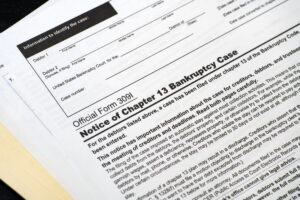
There are many reasons a small business may wish to file for bankruptcy protection. Economic downturns, natural disasters and many other events beyond an owner’s control may cause a small business to fall into insolvency. Other events – for example, a wrongful firing suit by a disgruntled employee – can be just as devastating financially as a tornado or flood.
Here are some things you should not do if a bankruptcy filing for your business may be in your near future.
Don’t Make “Preference” Payments
As the name suggests, a “preference” payment to a creditor is one made outside the ordinary course of business. Say, for example, you make monthly loan payments to a close business associate or family member and you decide before you file to repay them in full. The bankruptcy trustee will review all payments during the “preference period” before you file. The idea is to prevent some creditors from getting an advantage over others. The trustee has the power to recapture (by filing a lawsuit, if necessary) any preferential payments and be sure they’re divided fairly among your creditors.
You can also unwittingly make preference payments to yourself by repaying a loan you made to the business, paying yourself a bonus or collecting back pay.
There are exceptions, but the preference rules are complicated. An experienced Colorado bankruptcy lawyer can explain them and help you identify any payments you’ve made that may fall into the preference category.
Don’t Borrow From Friends or Family
The problem here is that the bankruptcy trustee will try to treat these payments as gifts rather than loans. If he’s successful, the friend or relative won’t be able to apply as a creditor for a share of your assets in the bankruptcy.
Don’t Use Credit on Personal Luxury Purchases
If you buy lots of luxury goods (a boat, expensive clothing or jewelry, for example) on credit too close to your filing date, the trustee or the creditor will argue that the debts were fraudulent; you never had the intent to repay them. If they’re successful, those debts won’t be discharged in your bankruptcy case.
The same holds true of large cash advances on a credit card, even if it’s a personal account.
Again, the details and exceptions are somewhat complicated, so be sure to consult a qualified bankruptcy lawyer as far as possible in advance of your filing.
Don’t Filch the Company’s Equipment
If you operate your business through a corporation, LLC or partnership and have decided to file for bankruptcy, it will be tempting to take home company assets such as office equipment, supplies or inventory to keep them out of your creditors’ reach. That’s considered the same thing as stealing from your creditors and can result in the dismissal of your petition. It could even lead to criminal charges.
The major exception is if you’re a sole proprietor. Since you’ve owned the assets all along, you can’t logically transfer them to yourself. But don’t think that as a sole proprietor you can get away with forming a corporation and transferring assets to it – those transfers are also likely to be treated as fraudulent.
Don’t Sweat Utilities and Rent
In general, if you wish to stay in business, your utility companies can’t shut you off solely because you filed for bankruptcy. The same rule applies to eviction by your landlord. Naturally, you will have to keep paying your electric and other utility bills and your rent.
Don’t Hold Onto Leased Property
If you intend to close up shop and liquidate and the business uses leased equipment, consider surrendering it before you file. The leasing company is going to be allowed to repossess the equipment anyhow. Also, you can save some money. Even if the lessor sues you for the future payments under the lease, those ordinarily will be discharged in the bankruptcy.
Don’t Stop Paying Your Insurance Premiums
Even if you’re shutting the doors, keep your liability insurance in force. One of the many rules associated with Murphy’s Law says that the day after you cancel someone will slip and fall on your sidewalk.
If your small Colorado business is struggling financially and you think business bankruptcy may be the best solution, contact us. Even if you’re not sure about filing, let us help you understand what to expect from the bankruptcy process and what you can do to prepare.


